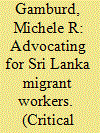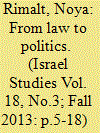| Srl | Item |
| 1 |
ID:
087033


|
|
|
|
|
| Publication |
2009.
|
| Summary/Abstract |
Nearly a million Sri Lankan women labor overseas as migrant workers, the vast majority in the Gulf Cooperation Council (GCC) countries in West Asia. They are poorly paid and vulnerable to a wide variety of exploitative labor practices at home and abroad. Despite the importance of worker remittances to Sri Lanka's national economy, and in spite of the nation's history of organized labor and active political participation, migrants have received only anemic support from the state, labor unions, feminist organizations, and migrant-oriented nongovernmental organizations. The article contextualizes Sri Lankan migration within larger-scale economic dynamics (such as global capitalist policies and processes) and local-level ideological formations (such as local political histories and culturally shaped gender norms). The author argues that political freedoms in destination countries have a significant effect on organizing activities in both host and sending nations. Comparing the Sri Lankan and Philippine situations, the author contends that the vibrant activism in the Philippines correlates with the liberal organizing climates in the European Union and in East and Southeast Asia, while the paucity of organizing in Sri Lanka correlates with the strict repression of guest workers in the GCC. Compared to other destinations, the GCC countries give workers (particularly women) less chance for autonomous activities, are less open to labor organizing, and are less responsive to political protest.
|
|
|
|
|
|
|
|
|
|
|
|
|
|
|
|
| 2 |
ID:
123871


|
|
|
|
|
| Publication |
2013.
|
| Summary/Abstract |
For several decades Israeli feminism focused on law in its efforts to promote greater gender equality in Israel. The common wisdom was that legal reforms provide the most effective tools for undermining social structures of inequality and empowering women in the public sphere. Over the years this understanding motivated numerous legal battles that were aimed at using the law as an agent of gender equality. Starting in the 1980s various female litigants, aided by civil rights and feminist organizations, approached the Supreme Court as part of their efforts to remedy injustices of discrimination. For example, Leah Shakdiel, backed by ACRI, was a pioneer in the 1980s in securing women the right to equal membership in municipal rabbinical administrations; Neomi Nevo headed a feminist effort to amend retirement policies in Israel and eventually guaranteed women the right to retire at the same age as men; Alice Miller's efforts to become a military pilot a decade later initiated major legal reforms in military policies toward women that enabled them to serve in various combat roles.
|
|
|
|
|
|
|
|
|
|
|
|
|
|
|
|